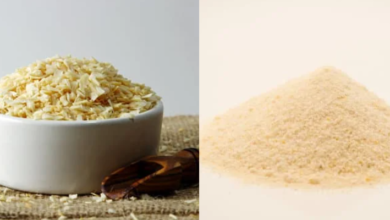Onion Powder Vs Dehydrated Onion: Which One Is More Affordable?
What To Know
- It packs a concentrated onion flavor into a compact form, making it a convenient addition to recipes.
- When rehydrated, dehydrated onion regains a texture similar to fresh onions, providing a more authentic onion experience.
- Whether you crave intense onion flavor or a more authentic onion experience, these versatile ingredients cater to a wide range of culinary needs.
Onions, a culinary staple, add depth of flavor to countless dishes. But when it comes to convenience, onion powder and dehydrated onion offer practical alternatives. Let’s delve into their differences to help you make informed culinary choices.
Onion Powder
Onion powder is a finely ground powder made from dried onions. It packs a concentrated onion flavor into a compact form, making it a convenient addition to recipes.
Pros:
- Intense flavor: Onion powder delivers a potent onion flavor, amplifying the taste of soups, sauces, marinades, and rubs.
- Convenience: Its powdered form makes it easy to measure and incorporate into dishes.
- Shelf life: Onion powder has a longer shelf life than fresh onions, allowing for extended storage.
Cons:
- Loss of texture: Unlike fresh onions, onion powder lacks the crunchy texture and sweetness of raw onions.
- Limited versatility: Onion powder primarily enhances savory dishes and may not be suitable for all culinary applications.
Dehydrated Onion
Dehydrated onion is made by slicing or dicing onions and removing their moisture through a drying process. It retains the shape and some of the texture of fresh onions.
Pros:
- Rehydrated texture: When rehydrated, dehydrated onion regains a texture similar to fresh onions, providing a more authentic onion experience.
- Versatility: Dehydrated onion can be rehydrated and used in various culinary applications, including salads, soups, stews, and as a topping.
- Nutrient retention: Dehydration preserves some of the nutrients found in fresh onions, such as vitamin C and antioxidants.
Cons:
- Less concentrated flavor: Compared to onion powder, dehydrated onion has a milder onion flavor, requiring larger quantities for similar taste intensity.
- Rehydration time: Dehydrated onion requires rehydration before use, which can add an extra step to the cooking process.
- Shorter shelf life: While dehydrated onion has a longer shelf life than fresh onions, it is not as durable as onion powder.
Comparison Table
| Feature | Onion Powder | Dehydrated Onion |
| — | — | — |
| Form | Fine powder | Sliced or diced |
| Flavor | Intense | Milder |
| Convenience | Easy to measure | Requires rehydration |
| Texture | No texture | Retains some texture |
| Versatility | Savory dishes | Various culinary applications |
| Shelf life | Longer | Shorter |
| Nutrient retention | Lower | Higher |
Which One to Choose?
The choice between onion powder and dehydrated onion depends on your culinary needs and preferences.
- For intense onion flavor and convenience: Onion powder is the ideal choice.
- For a more authentic onion texture and versatility: Dehydrated onion is the better option.
- For nutrient retention: Dehydrated onion wins due to its higher nutrient content.
Culinary Applications
- Onion powder: Use in soups, sauces, marinades, rubs, and as a seasoning for meats and vegetables.
- Dehydrated onion: Rehydrate and use in salads, soups, stews, stir-fries, and as a topping for pizzas and casseroles.
Tips for Using Onion Powder and Dehydrated Onion
- Use sparingly: Onion powder is highly concentrated, so start with small amounts and adjust to taste.
- Rehydrate dehydrated onion thoroughly: Use hot water or broth to rehydrate dehydrated onion for optimal flavor and texture.
- Experiment with different varieties: Both onion powder and dehydrated onion come in different varieties, such as white, yellow, and red, each offering unique flavor profiles.
Takeaways: The Perfect Pairing
Onion powder and dehydrated onion offer distinct advantages and culinary applications. By understanding their differences and using them appropriately, you can elevate your dishes to the next level. Whether you crave intense onion flavor or a more authentic onion experience, these versatile ingredients cater to a wide range of culinary needs.
Questions You May Have
Q: Is onion powder healthier than dehydrated onion?
A: While dehydrated onion retains some nutrients, onion powder typically has a lower nutrient content due to the drying process.
Q: Can I substitute onion powder for dehydrated onion?
A: Yes, but you may need to use more onion powder to achieve a similar flavor intensity.
Q: What is the best way to store onion powder and dehydrated onion?
A: Store both onion powder and dehydrated onion in airtight containers in a cool, dry place.
